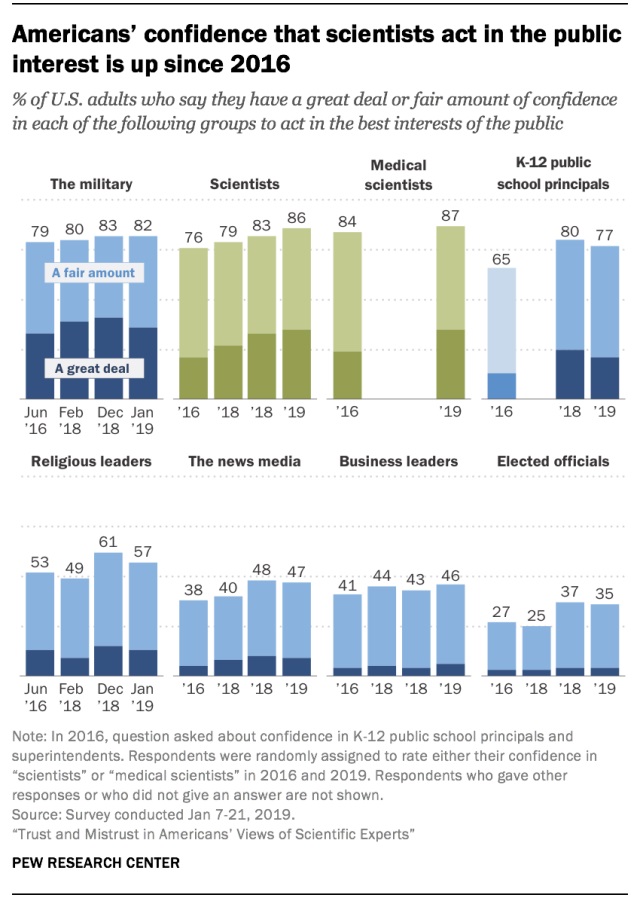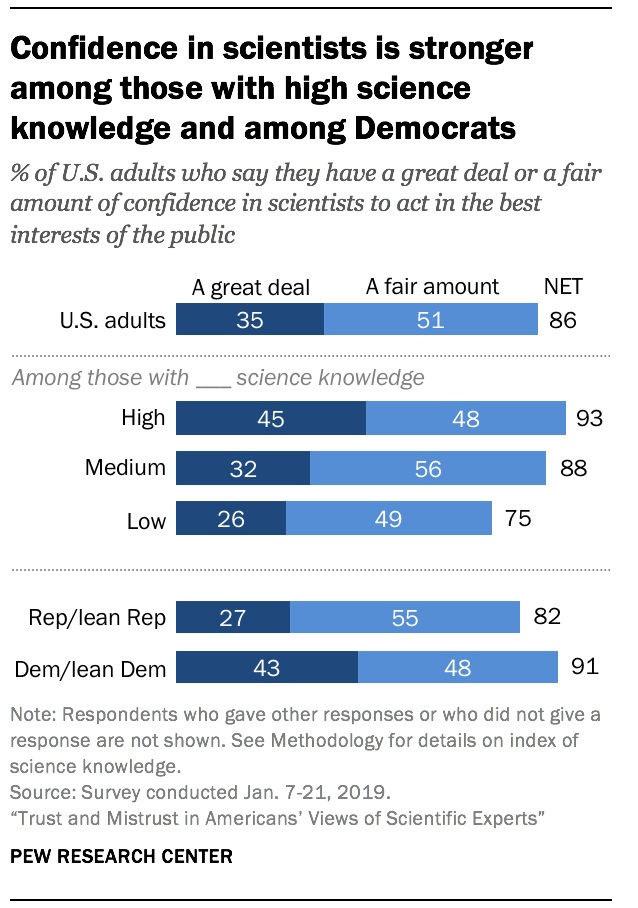Communications of the ACM
Scientists Should Play Active Role In Science Policy Debates, Survey Finds

In an era when science and politics often appear to collide, public confidence in scientists is on the upswing, and six-in-ten Americans say scientists should play an active role in policy debates about scientific issues, according to a new Pew Research Center survey.
The survey finds public confidence in scientists on par with confidence in the military. It also exceeds the levels of public confidence in other groups and institutions, including the media, business leaders, and elected officials.
At the same time, Americans are divided along political party lines in terms of how they view the value and objectivity of scientists and their ability to act in the public interest. And, while political divides do not carry over to views of all scientists and scientific issues, there are particularly sizable gaps between Democrats and Republicans when it comes to trust in scientists whose work is related to the environment.
Higher levels of familiarity with the work of scientists are associated with more positive and more trusting views of scientists regarding their competence, credibility, and commitment to the public, the survey shows.
Overall, 86% of Americans say they have at least "a fair amount" of confidence in scientists to act in the public interest. This includes 35% who have "a great deal" of confidence, up from 21% in 2016.

But a partisan divide persists. More Democrats (43%) than Republicans (27%) have "a great deal" of confidence in scientists — a difference of 16 percentage points. The gap between the two parties on this issue (including independents who identify with each party, respectively) was 11 percentage points in 2016 and has remained at least that large since.
There are also clear political divisions over the role of scientific experts in policy matters, with Democrats more likely to want experts involved and to trust their judgment. Most Democrats (73%) believe scientists should take an active role in scientific policy debates. By contrast, a majority of Republicans (56%) say scientists should focus on establishing sound scientific facts and stay out of such policy debates. The two political groups also differ over whether scientific experts are generally better at making decisions about scientific policy issues than other people: 54% of Democrats say they are, while 66% of Republicans think scientists' decisions are no different from or worse than other people's. Finally, Democrats and Republicans have different degrees of faith in scientists' ability to be unbiased; 62% of Democrats say scientists' judgments are based solely on facts, while 55% of Republicans say scientists' judgments are just as likely to be biased as other people's.

The Center's new survey highlights the degree to which the public values scientific expertise and how those perceptions are sometimes shaped by the crosscurrents of politics as well as familiarity with scientists and their work. More specifically, it shines a spotlight on trust and potential sources of mistrust connected with scientists who work in three fields: medicine, nutrition, and the environment. They include medical research scientists, medical doctors, nutrition research scientists, dietitians, environmental research scientists, and environmental health specialists.
The survey of 4,464 adults was conducted in January 2019 using Pew Research Center's American Trends Panel, a nationally representative panel of randomly selected U.S. adults.
The survey probed for people's trust in scientists, along with potential sources of mistrust. To capture trust, the survey asked respondents how often they can count on scientists to perform their jobs with competence, to show care or concern for the public and to present their findings or recommendations in a fair and accurate way. The survey also asked for views about scientific integrity, including the extent to which misconduct is a problem, the degree to which scientists are open about potential conflicts of interest, and whether they accept accountability for mistakes.
 Among other important findings:
Among other important findings:
- Despite generally positive views about scientists across all six specialties, most Americans are skeptical about key areas of scientific integrity. No more than two-in-ten Americans believe scientists across these groups are transparent about potential conflicts of interest with industry all or most of the time. Similarly, minorities (ranging from 11% to 18%) say scientists regularly admit their mistakes and take responsibility for them. Between about a quarter and half of Americans consider misconduct a "very big" or "moderately big" problem, with the public generally skeptical that those engaged in misconduct routinely face serious consequences.
- Americans tend to trust science practitioners, who directly provide treatments and recommendations to the public, more than researchers working in the same areas. For example, 47% say dietitians provide fair and accurate information about their recommendations all or most of the time, compared with 24% for nutrition scientists discussing their research. There is a similar gap when it comes to information from medical doctors and medical research scientists (48% and 32%, respectively, say they provide fair and accurate information all or most of the time). However, trust in environmental health specialists — practitioners who offer recommendations to organizations and community groups — is about the same as that for environmental research scientists.
- When Americans gauge the kinds of things that would influence their faith in scientific findings, their verdict is clear: Open public access to data and independent committee reviews inspire the most confidence in scientists and boost their trust in research findings.
- A majority of U.S. adults (54%, including equal shares of Democrats and Republicans) believe the public should play an important role in guiding policy decisions on scientific issues; 44% say public opinion should not play an important role because the issues are too complex for the average person to understand.
- Public confidence in medical scientists is similar to that for scientists overall; 87% report either a great deal (35%) or a fair amount (52%) of confidence in medical scientists to act in the best interests of the public.
- Americans with more factual science knowledge have greater confidence than those with less science knowledge that scientists act in the public interest. (For more information about the science knowledge index, see "What Americans Know About Science.")
- Black and Hispanic adults are more likely than whites to see professional or research misconduct as a very or moderately big problem. For doctors, for example, 71% of blacks and 63% of Hispanics say misconduct is at least a moderately big problem, compared with 43% of whites. A larger percentage of blacks (59%) and Hispanics (60%) than whites (42%) say misconduct by medical research scientists is a very big or moderately big problem.
No entries found